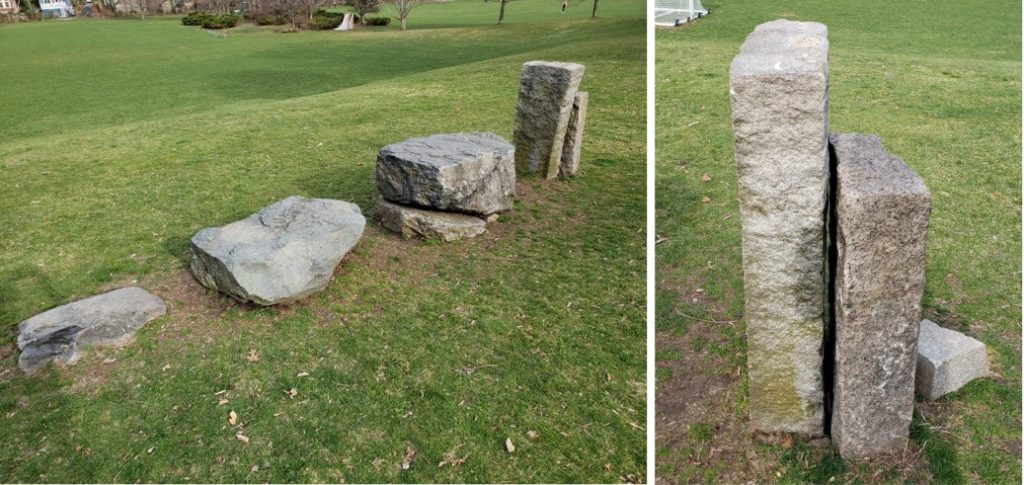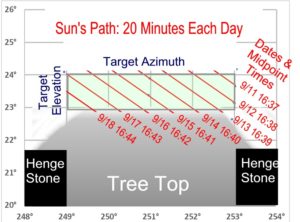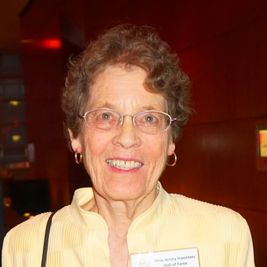
 In Newton’s Weeks Field, there’s a partially buried row of stones reminiscent of Stonehenge, which some have dubbed Newtonhenge. Between the two taller stones at the southern end of the row is a narrow slit. So when might the sun shine through it? The slit between those stones is oriented about 251° from north, and the sun sets behind a treetop just west of the stones at about 24° above horizontal. NOAA offers a solar position calculator that shows the azimuth and elevation of the sun for any suitable combination of latitude, longitude, date, and time. It tells us that, weather permitting, the sun will shine over that treetop and through the slit of Newtonhenge this week, September 11-17, at times ranging from 4:37PM to 4:43PM (each day: one minute later and half a degree lower). Each day, the sun might shine through for about 10 minutes either side of those times. September 14 and 15 are the days when the sun should be just above treetop for the center of its time shining through. Anyway, that’s my prediction, to be tested this week
In Newton’s Weeks Field, there’s a partially buried row of stones reminiscent of Stonehenge, which some have dubbed Newtonhenge. Between the two taller stones at the southern end of the row is a narrow slit. So when might the sun shine through it? The slit between those stones is oriented about 251° from north, and the sun sets behind a treetop just west of the stones at about 24° above horizontal. NOAA offers a solar position calculator that shows the azimuth and elevation of the sun for any suitable combination of latitude, longitude, date, and time. It tells us that, weather permitting, the sun will shine over that treetop and through the slit of Newtonhenge this week, September 11-17, at times ranging from 4:37PM to 4:43PM (each day: one minute later and half a degree lower). Each day, the sun might shine through for about 10 minutes either side of those times. September 14 and 15 are the days when the sun should be just above treetop for the center of its time shining through. Anyway, that’s my prediction, to be tested this week
All posts by Bruce Henderson
STEM Education has Lost a Gem: Dr. Gertrude Clarke
 Dr. Gertrude M. Clarke, an inspiring classroom teacher and brilliant scientist, passed away on May 15 at the age of 88. I’ve been writing the NewtonSTEM blog for over nine years now, driven by an interest in STEM ignited 50+ years ago in Dr. Clarke’s physics class in Chatham, NJ. Besides being my favorite teacher, she:
Dr. Gertrude M. Clarke, an inspiring classroom teacher and brilliant scientist, passed away on May 15 at the age of 88. I’ve been writing the NewtonSTEM blog for over nine years now, driven by an interest in STEM ignited 50+ years ago in Dr. Clarke’s physics class in Chatham, NJ. Besides being my favorite teacher, she:
- Studied atomic, nuclear, and solid waste physics at Yale;
- Earned her Ph.D. from Rutgers University;
- Conducted research at Brookhaven National Laboratory, with the Rutgers University accelerator, with Harvard University’s cyclotron, and at Stevens Institute of Technology’s laser laboratory;
- Taught physics, science survey, practical chemistry, and environmental science at Chatham High School and created a high-school AP course in nucleonics;
- Received honors from Princeton University and the National Science Teachers Associations for her excellence in high-school teaching;
- Improved the precision of medical proton beams in numerous cancer treatments through her research;
- Founded the New Jersey Business/Industry/Science Education Consortium and served as its Executive Director;
- Was a trustee, the first woman president, and later an inductee of the New Jersey Inventors Hall of Fame.
Dr. Clarke was super smart, energetic, understanding, and super dedicated to her students, with a great sense of humor. Her classes were fun, challenging, and enlightening. I remember her saying one day, as we worked on experiments, “This is a laboratory — with the emphasis on labor, not oratory!” I’m sure that Dr. Clarke inspired several hundred students to pursue careers in science, engineering, and STEM education.
Ligerbots to Compete in FIRST Regional Tournament at WPI, March 7-9
Come see the Ligerbots — Newton’s FIRST robotics team — compete against 41 other teams from around the world in the FIRST Regional Tournament hosted by Worcester Polytechnic Institute, on March 7-9. FIRST is a program designed to inspire high school students to pursue higher education and careers in STEM. In this tournament, over 40 teams will compete from all over the world. Each team has 6 weeks to build a robot to compete in the same game.
Leanora McVittie, Ligerbots CEO, reports: Continue reading Ligerbots to Compete in FIRST Regional Tournament at WPI, March 7-9
NNHS/NSHS Science Teams Seek Local Sponsors
The science teams of Newton South HS and Newton North HS are large (more than 30 students each), open to all interested students, mostly student-run, and very successful in a wide range of events. In last year’s State Science Olympiad, they came in second and third place statewide, respectively. The teams support students to develop scientific inquiry skills, to increase their content knowledge, and most critically to work together collaboratively as a team.
The students pay fees and conduct fundraisers to cover the costs of competition registrations, books, tools, and materials. They also pay a $125/person club fee to NPS. The two teams are seeking local sponsors — businesses or individuals — to help with the $1700 annual cost of bus transportation to competitions. The teams share buses, which are not paid by NPS.
If you would like to help keep these teams strong, please make a contribution by sending a check (made out to “City of Newton” with “Science Team Bus” in the memo) to:
Amy D. Picard Winston
Science and Technology/Engineering Dept. Head
Newton North HS, 457 Walnut St., Newton, MA 02460
If you have questions or ideas for recruiting sponsors, please contact her at amy_winston@newton.k12.ma.us or 617-559-6380. To contact the teams:
NNHS: nnhs-science.wikidot.com or www.facebook.com/NNHSsciteam
NSHS: southscienceteam@gmail.com
NNHS InvenTeam Receives Grant for Pedestrian Alert System
This year, Newton North is one of 16 high schools nationwide to be selected as an InvenTeam. InvenTeam, funded by the Lemelson Foundation and administered by MIT’s School of Engineering, celebrates outstanding innovators and inspires young people to pursue creative lives and careers through invention.
Challenged to apply its STEM skills to solve a real-world problem, the Newton North team developed a proposal to invent a Pedestrian Alert System. The World Health Organization, naming 2011-2020 the Decade of Action for Road Safety, notes that road traffic injuries are one of the top 3 leading causes of death for ages 5-44. In 2004, road traffic injuries resulted in more than 1.27 million deaths—almost equal to the number of deaths caused by HIV/AIDS, tuberculosis, and malaria combined. The Newton North team found that Ethiopia has among the highest road traffic fatalities per vehicle.
In October, the Newton North team won an InvenTeam grant of $10,000 for its proposal to invent a Pedestrian Alert System to warn drivers of crossing pedestrians, with the ultimate aim to help pedestrians in developing countries safely cross dangerous roads. The grant can be used only to purchase materials for experimenting and prototyping. The actual fabrication must be funded by the team. (You can donate online to help the team meet its goal.) In June, the team will present a working prototype at the MIT EurekaFest. See this brief video of the team presenting to its project mentors.
The Newton North InvenTeam is nearing the final phase of the project — building a working prototype. Updates of the team’s recent activities and milestones can be found at nnhsinventeam.com.
Goldie Blox: New Engineering Toys for Girls
Recently funded through Kickstarter, a new toy company, Goldie Blox, is receiving lots of attention and will deliver its first product in February, 2013. It’s a construction toy and book series starring Goldie, a kid inventor who loves to build. The kit combines spatial and verbal skills and is aimed for girls 5 to 9 years old. The second and third sets of the series, to be released in the spring, will introduce more engineering principles, new characters, and more construction pieces. You can pre-order sets, track the company’s production progress, and see what’s new at www.GoldieBlox.com. See videos on Goldie Blox’ Youtube channel.
Notes from the Mass. STEM Summit: Focus on Instilling STEM Identity
The statewide Massachusetts STEM Summit was held Oct. 18 at Gillette Stadium, with 1200 attendees.
- Astronaut Cady Coleman, in her keynote, spoke of the need not just to inform and inspire, but to help students — particularly girls and under-represented minorities — to identify as STEM folks, to see themselves in STEM careers.
- The Girl Scouts noted a survey showing that 74% of girls state an interest in STEM, but only 13% say they are considering a STEM career.
- Science Club for Girls enrolls not only community volunteers but also “near-peer” mentors, who learn to see themselves as people who can talk and teach STEM as they work with K-6th Grade students.
- Milton High School’s technology club teaches 4th-5th graders in a four-day summer session on robotics — raising money for the high-school program, inspiring the next generation of kids, and teaching the high schoolers a bit about teaching.
- Boston University runs the Artemis Project (a five-week summer program in which Computer Science undergraduate women introduce rising 9th grade girls to computer science) and a one-week Summer Pathways program (for rising Juniors and Senior girls to explore STEM careers).
- And it was good to hear Massachusetts Secretary of Education, Paul Reville, speak of his visit to the Innovation Lab at Newton North HS last February.
